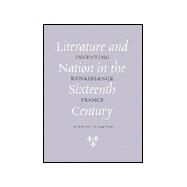Literature and Nation in the Sixteenth Century
, by Hampton, Timothy- ISBN: 9780801437748 | 0801437741
- Cover: Hardcover
- Copyright: 1/1/2001
Assessing the relationship between the emergence of modern French literary culture and the ideological debates that marked Renaissance France, Timothy Hampton explores the role of literary form in shaping national identity. The foundational texts of modern French literature were produced during a period of unprecedented struggle over the meaning of community. In the face of religious heresy, political threats from abroad, and new forms of cultural diversity, Renaissance French culture confronted, in new and urgent ways, the question of what it means to be "French." Hampton shows how conflicts between different concepts of community were mediated symbolically through the genesis of new literary forms. Hampton's analysis of works by Rabelais, Montaigne, Du Bellay, and Marguerite de Navarre, as well as writings by lesser-known poets, pamphleteers, and political philosophers, shows that the vulnerability of France and the instability of French identity were pervasive cultural themes during this period. Contemporary scholarship on nation-building in early modern Europe has emphasized the importance of centralized power and the rise of absolute monarchy. Hampton offers a counterargument, demonstrating that both community and national identity in Renaissance France were defined through a dialogic relationship to that which was not French-to the foreigner, the stranger, the intruder from abroad. He provides both a methodological challenge to traditional cultural history and a new consideration of the role of literature in the definition of the nation.







